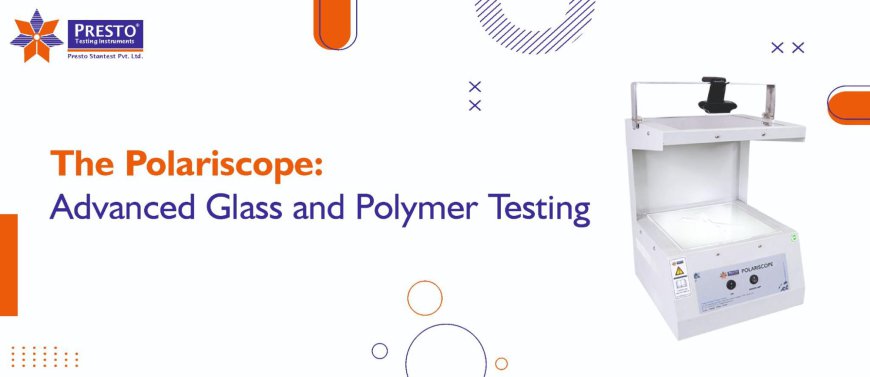The Polariscope: Advanced Glass and Polymer Testing
A Polariscope is an optical instrument designed to study materials concerning strain or stress by analysis through polarized light. Polarized light, where the waves of light vibrate in one plane, enables the Polariscope to identify stresses on the material.

In glass manufacturing and polymers, the integrity and quality of the materials hold major significance. Among the numerous instruments used for inspection, the Polariscope is one of the most important instruments. Using this optical tool, manufacturers can detect strain, stress, and other defects that the naked eye may ignore. Whether it's tempered glass or a more complex polymer product, a Polariscope strain viewer gives manufacturers a great idea about the structural integrity of their materials, thus enabling manufacturers to optimize their production and ensure quality products.
What is a Polariscope?
A Polariscope is an optical instrument designed to study materials concerning strain or stress by analysis through polarized light. Polarized light, where the waves of light vibrate in one plane, enables the Polariscope to identify stresses on the material. It happens when the light moves through a stressed material and separates light waves into two beams which move at different velocities. Thus, through this analysis, the Polariscope generates a visual representation of how stressed the material is on its inner structure.
The Polariscope glass inspection includes putting the glass or polymer sample between two polarizing filters. One acts as the light source, and the other is an analyzer. Patterns and colours on the surface of the material indicate the amount and type of strain in the material.
Why Presto?
Presto Stantest is a pioneer in material testing and inspection trusted by more than 11,000 happy clients worldwide. We have more than 40 years of experience with national awards for commitment towards excellence with precision-engineered instruments and exceptional quality. Our Polariscopes are accurate, sturdy, and user-friendly. they are very aptly used for stress analysis purposes in glass and polymer industries.
Applications of the Polariscope in Glass and Polymer Industries
Glass Manufacturing
Stress analysis in glass manufacturing is important in ensuring that glass products meet all safety and performance standards. Polariscope glass inspection helps detect hidden defects such as fractures, uneven thickness, or uneven cooling during the tempering process, which can compromise the strength and durability of the glass.
During the manufacturing of tempered glass, it experiences stress and becomes prone to shattering at places inside. The Polariscope allows for the viewing of these stresses with interference colours that appear due to stressed areas when light from polarizers is made incident upon them. Manufacturers can detect such stress patterns that determine the final product's safety, resistance to impact and thermal shock, and others in exterior forces.
Polymer Industry
A Polariscope is very important to the polymer industries, particularly in inspecting polymer films, fibre, and other polymers. While being processed in different types of stresses usually induce defects through molecular orientations, variations of thickness in materials, as well as microfractures. The Polariscope visualize the same stress in these products of polymer processes and allows optimization of a production scheme so that such material may not be wasted due to these process stresses.
Polycarbonate, acrylic, and PET (polyethene terephthalate) polymers are prone to optical defects when under stress, and the use of a Polariscope strain viewer allows for their detection. This feature is very useful in industries such as automotive, electronics, and packaging, where strength and clarity of material are a prime necessity.
Key Features of a Polariscope
When purchasing a Polariscope, manufacturers have to consider several factors that affect the equipment’s effectiveness and usability in their operations. Our Polariscope has the following features:
-
High-quality Polarizing Filters: These filters ensure that the polarized light provided is uniform for accurate stress detection.
-
Adjustable Light Source: The light intensity can be set to suit the material thickness and stress pattern visibility.
-
Versatility: Our Polariscope models can be used for routine stress testing in various materials, such as glass, polymers, and composite materials.
-
Clear Images: Our quality Polariscope delivers clear and accurate images of stress-induced patterns, enabling operators to spot even the minutest defects.
Maintenance Tips for Polariscope
To maximize the longevity and accuracy of your Polariscope, consider these maintenance tips:
-
Routine Calibration: Calibration is essential for device operation. Regular calibration will yield accurate results every time.
-
Optical Component Cleaning: Optical surfaces must remain clean because impurities that accumulate on the lenses can hinder clarity in inspections. Use a clean soft cloth or specific lens wiper to clean these components.
-
Software and Firmware Updates: Polariscope models with integrated software for improved analytical capabilities. The software must have regular updates to prevent related problems in compatibility and functionality.
FAQs
Q1: How does the Polariscope help in detecting stress in glass?
A1: The Polariscope detects stress in glass by using polarized light, which creates interference patterns in stressed areas. These patterns help identify weak spots, cracks, and inconsistencies, which are critical for ensuring the strength and safety of the glass.
Q2: Is the Polariscope only useful for glass inspection?
A2: Yes, the Polariscope is versatile and is also widely used in the polymer and glass industry to detect internal stress and defects in materials like glass, plastics, films, and fibres.
Q3: What Polariscope price?
A3: A3: Polariscope price can vary depending on the features, quality, and intended function. Basic models start from ~₹80,000, advanced digital control systems and enhanced optics can cross ₹8,00,000.
Q4: Can it detect all forms of stress present in materials?
A4: The Polariscope helps you detect internal stresses in PET preforms. However, other forms of defects, such as the presence of inclusions and voids, can also be detected.
Using the Polariscope with care and comprehension will lead to more productive production and superior quality.
Phone: +91 9210 903 903
Mail: info@prestogroup.com
